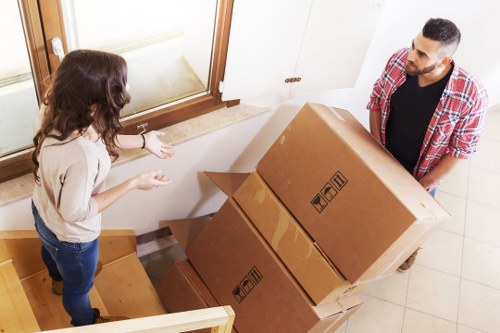Furniture Disposal North London: Your Comprehensive Guide

Disposing of furniture in North London doesn't have to be a daunting task. Whether you're upgrading your home, moving, or simply decluttering, understanding the best ways to dispose of your old furniture can save you time, money, and stress.
Furniture disposal is more than just throwing items away; it's about responsible waste management and environmental sustainability. With numerous options available, it's essential to choose the method that aligns with your needs and values.
In this guide, we'll explore various furniture disposal methods, provide tips for selecting the right disposal service, and highlight the benefits of proper furniture disposal in North London.

Why Proper Furniture Disposal Matters
Proper disposal of furniture is crucial for several reasons:
- Environmental Protection: Ensures that recyclable materials are processed correctly, reducing landfill waste.
- Health and Safety: Prevents potential hazards from improperly disposed furniture, such as sharp edges or toxic materials.
- Legal Compliance: Adheres to local regulations regarding waste management and disposal.
By following the right disposal practices, you contribute to a cleaner and safer North London community.

Methods of Furniture Disposal
1. Donation
Donating your furniture is a great way to give back to the community. Local charities, shelters, and non-profit organizations in North London often welcome gently used furniture.
2. Recycling
Recycling ensures that materials like wood, metal, and fabric are repurposed, reducing the need for new resources.
3. Selling
If your furniture is in good condition, consider selling it through online marketplaces or local classifieds to earn some extra cash.
4. Bulk Waste Collection
North London Boroughs offer bulk waste collection services, allowing residents to dispose of large items conveniently.

Choosing the Right Furniture Disposal Service
When selecting a disposal service, consider the following factors:
- Reputation: Look for services with positive reviews and a history of reliable service.
- Cost: Compare prices to find a service that fits your budget.
- Environmental Practices: Ensure the service follows eco-friendly disposal methods.
- Convenience: Choose a service that offers flexible scheduling and easy booking options.
By evaluating these aspects, you can find a disposal service that meets your specific needs.

Environmental Impact of Furniture Disposal
Furniture disposal has significant environmental implications. Improper disposal can lead to increased landfill waste, pollution, and resource depletion. By opting for recycling or donating, you help conserve natural resources and reduce environmental harm.
Additionally, responsible disposal practices minimize the carbon footprint associated with manufacturing new furniture, promoting sustainability.
In North London, adopting eco-friendly disposal methods contributes to the city's green initiatives and helps preserve local ecosystems.
Cost Considerations
The cost of furniture disposal varies based on the method you choose:
- Donation: Generally free, though some organizations may cover transportation costs.
- Recycling: Costs can range from free to a small fee depending on the service provider.
- Selling: Potential to earn money, but may require effort in listing and negotiating.
- Bulk Waste Collection: Fees may apply based on the size and quantity of items.
Consider your budget and the value you place on different disposal methods when making a decision.
Local Regulations and Guidelines
North London has specific regulations regarding furniture disposal to ensure environmental and public health standards are met. It's essential to familiarize yourself with these guidelines:
- Sorting Requirements: Separate recyclable materials from non-recyclable ones.
- Collection Schedules: Follow the designated pickup days for bulk waste.
- Restricted Items: Certain items like mattresses or upholstered furniture may have specific disposal rules.
Adhering to local regulations helps maintain order and efficiency in waste management across North London.
Tips for Efficient Furniture Disposal
To streamline the furniture disposal process, consider these tips:
- Assess the condition of your furniture to decide the best disposal method.
- Plan and schedule your disposal in advance to avoid last-minute hassles.
- Measure large items to ensure they fit through doorways and can be transported easily.
- Disassemble furniture if possible to save space and simplify transportation.
Implementing these strategies can make furniture disposal more manageable and less stressful.
10-15 Nearby Areas to North London for Furniture Disposal
- Islington: Known for its vibrant community centers that accept furniture donations.
- Barnet: Offers bulk waste collection services twice a week, ideal for larger items.
- Camden: Home to numerous recycling centers specializing in furniture.
- Enfield: Provides both recycling and donation options for residents.
- Haringey: Features eco-friendly disposal services and local charities for donations.
- Harlington: Offers affordable bulk waste collection and recycling facilities.
- Tottenham: Supports community-driven furniture reuse programs.
- Finsbury Park: Hosts regular collection drives for unwanted furniture.
- Highgate: Provides premium disposal services catering to upscale furniture.
- Ponsonby: Known for its efficient recycling centers and donation points.
- Tottenham Hale: Offers convenient disposal options with flexible scheduling.
- Wood Green: Features multiple facilities for recycling and donating furniture.
- East Finchley: Supports sustainable disposal practices through local initiatives.
- Winchmore Hill: Provides comprehensive disposal services, including pickup and recycling.
- Muswell Hill: Offers tailored disposal solutions for residential and commercial furniture.
Each of these areas provides unique features and services, making furniture disposal accessible and efficient for North London residents.
Benefits of Professional Furniture Disposal
Hiring a professional furniture disposal service offers numerous advantages:
- Efficiency: Professionals handle the heavy lifting and logistics, saving you time and effort.
- Safety: Ensures that furniture is disposed of safely without risking injury or property damage.
- Compliance: Guarantees that disposal practices align with local regulations and environmental standards.
- Convenience: Offers flexible scheduling and tailored services to meet your specific needs.
Choosing a professional service can simplify the disposal process and provide peace of mind.
DIY Furniture Disposal Tips
If you prefer to handle furniture disposal yourself, consider these DIY tips:
- Plan Ahead: Determine the best disposal method based on your furniture's condition.
- Gather Supplies: Ensure you have the necessary tools and materials for disassembly and transportation.
- Enlist Help: Recruit friends or family members to assist with heavy or cumbersome items.
- Dispose Responsibly: Follow local guidelines for separating recyclable materials and disposing of non-recyclables.
With careful planning, DIY disposal can be a cost-effective and rewarding option.
Common Furniture Disposal Mistakes to Avoid
- Ignoring Local Regulations: Failing to adhere to disposal guidelines can result in fines or improper disposal.
- Overlooking Recycling Opportunities: Not utilizing recycling can waste valuable resources and increase environmental impact.
- Improper Disposal Techniques: Using inappropriate methods can damage property or harm the environment.
- Delaying Disposal: Procrastinating can lead to clutter accumulation and complicate the disposal process.
Being aware of these common mistakes can help ensure a smooth and responsible furniture disposal experience.
Future Trends in Furniture Disposal
The furniture disposal industry is evolving with a focus on sustainability and technology:
- Increased Recycling Efforts: More companies are adopting comprehensive recycling programs to reduce waste.
- Digital Platforms: Online services make it easier to schedule pickups and track disposal processes.
- Eco-Friendly Materials: There's a growing trend towards using recyclable and biodegradable materials in furniture design.
- Community Initiatives: Local communities are organizing swap meets and donation drives to promote reuse.
Staying informed about these trends can help you make more sustainable disposal choices.
Conclusion
Furniture disposal in North London is a manageable and responsible process when approached with the right knowledge and resources. By understanding the various disposal methods, complying with local regulations, and considering environmental impacts, you can ensure a smooth transition when parting with your old furniture.
Whether you choose to donate, recycle, sell, or use a professional disposal service, each option has its unique benefits. Prioritize sustainable practices to contribute to a healthier environment and a cleaner community in North London.
Frequently Asked Questions
1. How much does furniture disposal cost in North London?
The cost varies depending on the disposal method chosen. Donation is typically free, while recycling and bulk waste collection may involve a small fee. Professional disposal services can range based on the size and quantity of items.
2. Can I dispose of all types of furniture in North London?
Most types of furniture can be disposed of, but certain items like mattresses or upholstered pieces may have specific regulations. It's best to check with your local council or disposal service for guidelines.
3. Are there environmentally friendly furniture disposal options?
Yes, recycling and donating furniture are environmentally friendly options. These methods help reduce landfill waste and promote the reuse of materials.
4. How do I schedule a bulk waste collection in North London?
You can schedule a bulk waste collection through your local borough's waste management website or by contacting their customer service. It's advisable to book in advance and adhere to the specified pickup days.
5. What should I do with broken or damaged furniture?
Broken or damaged furniture can often be recycled if the materials are still usable. Alternatively, some disposal services specialize in handling such items responsibly. Check with local services for specific options.